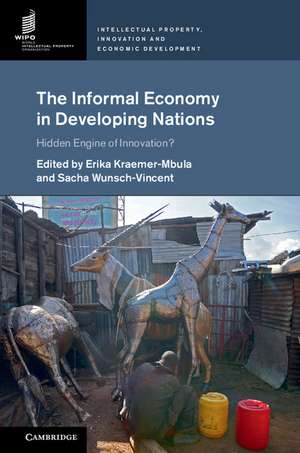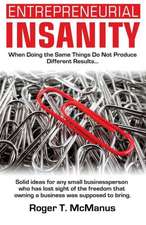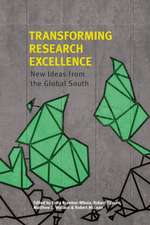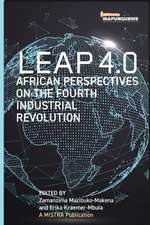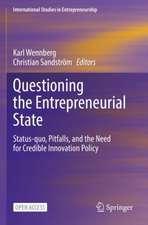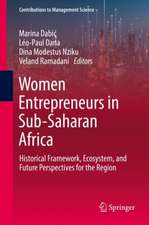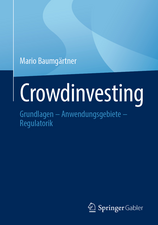The Informal Economy in Developing Nations: Hidden Engine of Innovation?: Intellectual Property, Innovation and Economic Development
Editat de Erika Kraemer-Mbula, Sacha Wunsch-Vincenten Limba Engleză Hardback – 19 oct 2016
Preț: 913.50 lei
Preț vechi: 1062.21 lei
-14% Nou
Puncte Express: 1370
Preț estimativ în valută:
174.79€ • 182.50$ • 144.67£
174.79€ • 182.50$ • 144.67£
Carte tipărită la comandă
Livrare economică 04-18 aprilie
Preluare comenzi: 021 569.72.76
Specificații
ISBN-13: 9781107157545
ISBN-10: 1107157544
Pagini: 436
Ilustrații: 42 b/w illus. 41 tables
Dimensiuni: 158 x 235 x 24 mm
Greutate: 0.82 kg
Editura: Cambridge University Press
Colecția Cambridge University Press
Seria Intellectual Property, Innovation and Economic Development
Locul publicării:New York, United States
ISBN-10: 1107157544
Pagini: 436
Ilustrații: 42 b/w illus. 41 tables
Dimensiuni: 158 x 235 x 24 mm
Greutate: 0.82 kg
Editura: Cambridge University Press
Colecția Cambridge University Press
Seria Intellectual Property, Innovation and Economic Development
Locul publicării:New York, United States
Cuprins
1. The informal economy: definitions, size, contribution and main characteristics Jacques Charmes; Comment 1.1 Adriana Mata Greenwood; Comment 1.2 Johannes Jütting; 2. Innovation in the informal economy Jeremy de Beer, Kun Fu and Sacha Wunsch-Vincent; Comment 2.1 Colin C. Williams; Comment 2.2 Fred Gault; Comment 2.3 Xiaolan Fu; 3. A study of the informal metalworking sector in Nairobi Christopher Bull, Steve Daniels, Mary Kinyanjui and Barrett Hazeltine; Comment 3.1 Joseph K. Kiplagat; 4. Informal manufacturing of home and personal care products in South Africa Erika Kraemer-Mbula; Comment 4.1 Nonhlanhla Mkhize; 5. Herbal medicine in the informal sector of Ghana George Owusu Essegbey and Stephen Awuni; Comment 5.1 Peter Arhin; 6. Appropriation and intellectual property in the informal economy Jeremy de Beer and Sacha Wunsch-Vincent; Comment 6.1 Emmanuel Sackey; Comment 6.2 Dick Kawooya; Comment 6.3 Shamnad Basheer; 7. Innovation policy and the informal economy: toward a new policy framework Erika Kraemer-Mbula and Almamy Konte; Comment 7.1 Anneline Morgan; Comment 7.2 Judith Sutz; 8. Formulating an agenda for the measurement of innovation in the informal economy Jacques Charmes, Fred Gault and Sacha Wunsch-Vincent; Comment 8.1 Philippe Mawoko; Annex 1. Ad hoc interview guidelines and questionnaires; Annex 2. Extract 1 from the generic questionnaire of stage 2 of the 1-2-3 survey; Annex 3. Kenya 2014.
Recenzii
'This book is timely and important. Developing countries need to build development strategies and design public policies on the basis of what they have.' Bengt-Åke Lundvall, Aalborg University, Denmark and Secretary General, Globelics
'This book encourages policy makers to better enable innovation in the informal sector. It is a meaningful contribution to the development of the South Africa's national strategic framework on Innovation for Inclusive Development.' Nonhlanhla Mkhize, Department of Science and Technology, South Africa
'This book will contribute to making innovation statistics and measurement work of the African Observatory for Science, Technology and Innovation more relevant to the African community.' Philippe Mawoko, Director of African Observatory of Science, Technology and Innovation
'Mainstream innovation and intellectual property debates have, for the most part, ignored what is commonly referred to as the 'informal' economy. This book aims to redress this deficit.' Shamnad Basheer, Honorary Research Chair of IP Law at Nirma University, India and Founder of SpicyIP (www.spicyip.com)
'This book's strong point is its emphasis on better measurement and evidence as essential pre-requisites to improved policy-making.' Mark Dutz, Lead Economist, Trade and Competitiveness, The World Bank Group
'Innovation may seem like a luxury; something countries can afford only once they have transcended issues of survival. But this attitude is outdated. Innovation can provide fundamental solutions to low-income countries and this book underlines this potential.' Xiaolan Fu, Founding Director of the Technology and Management Centre for Development, University of Oxford
'The divorce between informal endeavors and prevailing knowledge production practices developed in this book is immediately recognizable for all developing countries.' Judith Sutz, Universidad de la República, Uruguay and formerly Secretary of Science, Technology and Development, Latin American Commission of Social Sciences
'The democratisation of innovation, a wider participation of individuals and small firms in innovation, is a key factor for more inclusive growth. Considering the informal sector is critical in this regard, making this book an important contribution to this policy agenda.' Dominique Guellec and Caroline Paunov, Head of Division and Senior Economist, Directorate for Science, Technology and Innovation, Organisation for Economic Co-operation and Development
'The authors have managed to put into perspective the hitherto hidden and unexplored contribution of the informal sector to Kenya's modern economy and its industrialization process.' Joseph K. Kiplagat, Ministry of Industrialization and Enterprise Development, Kenya
'The Informal Economy in Developing Nations does an admirable job of detailing current thinking and mapping out the way forward in this area. Readers interested in broadening their understanding of innovation, ways to appropriate the returns to innovation with frugal resources, and potential policy support solutions will find the book useful. … the book is commendable for drawing from a geographically diverse group of contributors.' Nicola Searle, IPKat (www.ipkitten.blogspot.co.uk)
'This book is part of Cambridge University Press and WIPO's Intellectual Property, Innovation and Economic Development series. […] One commentator on the book has commended its contribution to innovation statistics and measurement work in Africa. It will be of great assistance for policy-makers building development strategies in countries where the informal economy plays an important role.' Michael Blakeney, European Intellectual Property Review
'This book encourages policy makers to better enable innovation in the informal sector. It is a meaningful contribution to the development of the South Africa's national strategic framework on Innovation for Inclusive Development.' Nonhlanhla Mkhize, Department of Science and Technology, South Africa
'This book will contribute to making innovation statistics and measurement work of the African Observatory for Science, Technology and Innovation more relevant to the African community.' Philippe Mawoko, Director of African Observatory of Science, Technology and Innovation
'Mainstream innovation and intellectual property debates have, for the most part, ignored what is commonly referred to as the 'informal' economy. This book aims to redress this deficit.' Shamnad Basheer, Honorary Research Chair of IP Law at Nirma University, India and Founder of SpicyIP (www.spicyip.com)
'This book's strong point is its emphasis on better measurement and evidence as essential pre-requisites to improved policy-making.' Mark Dutz, Lead Economist, Trade and Competitiveness, The World Bank Group
'Innovation may seem like a luxury; something countries can afford only once they have transcended issues of survival. But this attitude is outdated. Innovation can provide fundamental solutions to low-income countries and this book underlines this potential.' Xiaolan Fu, Founding Director of the Technology and Management Centre for Development, University of Oxford
'The divorce between informal endeavors and prevailing knowledge production practices developed in this book is immediately recognizable for all developing countries.' Judith Sutz, Universidad de la República, Uruguay and formerly Secretary of Science, Technology and Development, Latin American Commission of Social Sciences
'The democratisation of innovation, a wider participation of individuals and small firms in innovation, is a key factor for more inclusive growth. Considering the informal sector is critical in this regard, making this book an important contribution to this policy agenda.' Dominique Guellec and Caroline Paunov, Head of Division and Senior Economist, Directorate for Science, Technology and Innovation, Organisation for Economic Co-operation and Development
'The authors have managed to put into perspective the hitherto hidden and unexplored contribution of the informal sector to Kenya's modern economy and its industrialization process.' Joseph K. Kiplagat, Ministry of Industrialization and Enterprise Development, Kenya
'The Informal Economy in Developing Nations does an admirable job of detailing current thinking and mapping out the way forward in this area. Readers interested in broadening their understanding of innovation, ways to appropriate the returns to innovation with frugal resources, and potential policy support solutions will find the book useful. … the book is commendable for drawing from a geographically diverse group of contributors.' Nicola Searle, IPKat (www.ipkitten.blogspot.co.uk)
'This book is part of Cambridge University Press and WIPO's Intellectual Property, Innovation and Economic Development series. […] One commentator on the book has commended its contribution to innovation statistics and measurement work in Africa. It will be of great assistance for policy-makers building development strategies in countries where the informal economy plays an important role.' Michael Blakeney, European Intellectual Property Review
Descriere
This pioneering study offers a conceptual model and rich empirical evidence to help researchers and policy-makers understand informal innovation in developing countries.
